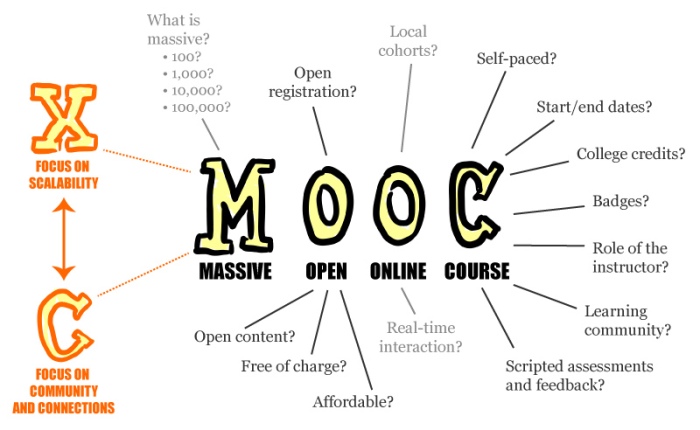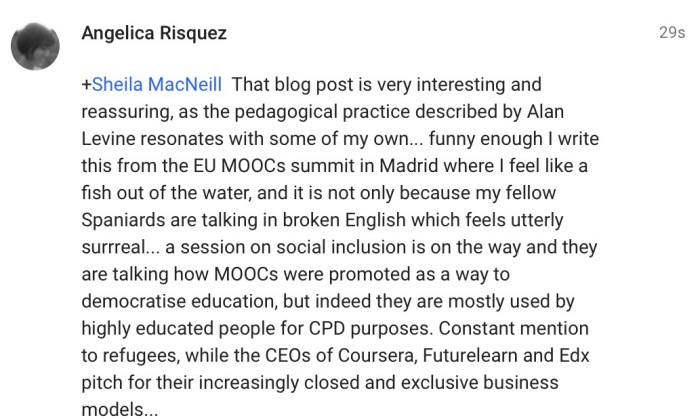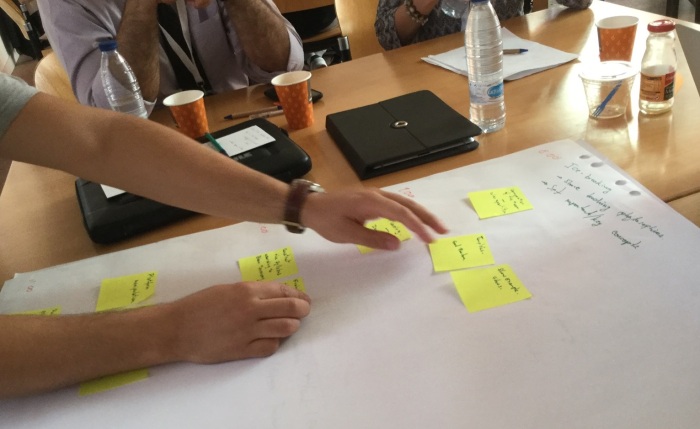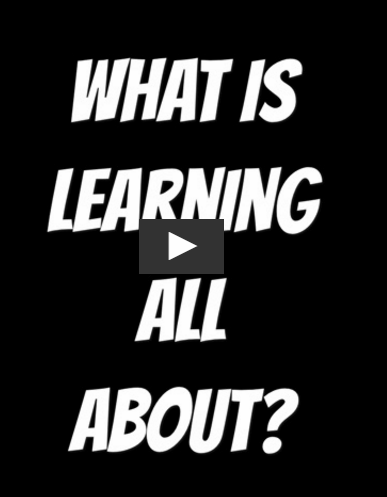I am privileged enough to be in a moment of my career when (coinciding with a big birthday coming up) I can afford to look at new areas where I want to develop, that inspire me and make me think. Open education is one of these, because for me, it resonates with sustainable, ethical, relevant and forward looking practice.
One of the most prominent areas around open education has to do, of course, with MOOCs, so when I realised that the 2017 International MOOC summit (where the CEOs of the main MOOC platforms were to meet) was to be hosted in my native hometown, a bare 10 minutes walk from where a grew up, I decided that it was a sign of destiny (ok, the perspective of my mum’s cooking may, only may, have also had something to do).
Since the most prestigious US universities joined the MOOC movement around 2012, these have received a huge amount of attention, paired with equal expectations that they would radically transform higher education as we know it. Five years on, it is obvious that the revolution has not materialised, and the practice of MOOCs has developed in diverse directions. One of the main divergences stems from the focus on the ‘M’ bit: is the course geared to taking over the world through scalability (these have come to be known as xMOOCs) or on the contrary, is the focus placed on a social learning, requiring (obviously) a level of human interaction (cMOOCs)?

MOOC poster April 4, 2013 by Mathieu Plourde licensed CC-BY on Flickr, explores the meaning of “Massive Open Online Courses” aka MOOCs.
Serendipity wanted that while planning to attend to this conference, I was in discussion with Prof Norman Jackson, who is leading our Contemporary Issues in Higher Education summer module (#TL5003) in our Graduate Diploma in Teaching, Learning and Scholarship. Norman has a vast experience in creative pedagogics, lifewide learning and, amongst many other endeavours, leads #CreativeHE (in collaboration with Chrissi Nerantzi and other like-minded colleagues), a community of creative academics which (they might not agree with this) could be somewhat categorised as the cMOOC type. The next iteration of the course was meant to run during the same week so I signed for the experience in the interest of authenticity and why not, a bit of fun CPD.
DAY 1 and 2
Expectations were hight for the main keynotes in Day 1 and 2. Sir Timothy O’Shea, principal in University of Edinburgh, opened the conference keynote and offered some interesting insights. Many were on the positive side: despite of evangelists having said that the MOOC would be the end of textbooks, they have actually been a driver for more textbooks being produced in his institution. This was counterbalance with the stark statistic that completion rates of (their extremely expensive) MOOCs are only around 6%. FutureLearn claims to be a catalyst of the digitisation efforts of universities, and one way of doing this is through online degrees with open pathways. As an example, the platform has partnered with Deakin to pioneer a full MA degree through Futurelearn, some of it paid and some through MOOCs. In other cases, MOOCs are compensated with university credits. In order to facilitate flipped classroom blended approaches, they are currently piloting a space with looks pretty much like a LMS… A more complete overview of the themes was curated in the #EMOOCS2017 twitter feed, but in general, I got the clear picture that after the MOOC hype, economic sustainability of these platforms and return on investment is the major elephant in the room.

Simon Nelson from FutureLearn quoted Inside HE (2017): ‘Gone are the promises about revolutionazing HE or driving most colleges and universities out of business. In their place is a pledge to work with colleges on how to offer education online and internationally’.
In the meantime, Day 1 of #CreativeHE had started. I found Google + (where the community is hosted) to be very confusing to use. I attempted to engage with the tasks, which invited us to produce creative artefacts to answer to specific challenges, but I found that I was ‘piggybacking’ in others’ creativity (with pictures of murals on the streets) rather than challenging myself with my own, but nevertheless, appetite was opening and I was slowly moving from the internal talk of ‘I don’t really have time for this’.

I found the themes that emerged in my real (i.e conference attending mode) and online world (in #CreativeHE) fed each other nicely (lifelong and lifewide education, the sustainability of the current educational model, and creativity as a ‘must’ for survival, rather than a ‘nice’ addition). The fact that the conference was hosted so close to home (this is, the one where you revert to your teenage bad habits) helped to contextualise things for me in the building where I used sneak in to find a place to study while being an undergrad, I walked back home to my mums’ lovely cooking and to spend time with my family and friends, and in turn, I found that progressively, I could incorporate discussions and memories into my creative endeavours for the #creativeHE tasks. It was all a nice experiential, ‘in the moment’ integration of living and learning on the go. Resources shared in #CreativeHE also informed my growing understanding of the MOOC phenomenon. I was also deepening my critical lenses into this world through posts such as Alan Levine’s ‘The future will not be powerpoint(ed), neither MOOCed‘, and finding reassurance in my remit of power as educational developer and citizen in this world… this, while I sat right next to Tim O’Shea talking about the Limerick weather!

DAY 3
On Wednesday I targeted the discussion panel on social inclusion and MOOCs chaired by @vincentzimmer, which highlights digital exclusion, and were wifi was (arguably) referred to as a ‘human right’. The starting point was that, while MOOCs have been argued as a means for democratising access to education, experience to date has shown that it tends to be used by those with a good level of educational attaintment for CPD purposes, rather than those most in need. As a response, the EU has developed a catalogue of initiatives in MOOCs that facilitate digital inclusion (http://moocs4inclusion.org/). This research has revealed that we know very little about the real impact of MOOC initiatives on digital integration. This is not to take away from the potential advantages provided by this model of education. For example, interesting insights followed into gender access. Vincent Zimmer reports their experience breaking cultural barriers to female education in refugee families, where at home MOOC education is making it socially acceptable. Of interest was also the discussion that followed about ‘educational colonisation’ of MOOC platforms based on the northern hemisphere, and the call for partnership approaches as an alternative. The argument is that they are many people that are taking MOOCs now that would not have access to education at all otherwise. The flip side (as argued by Tim O’Shea) is that the progressive reliance on online education poses a greater digital divide in many populations. In conclusion, I left with the feeling that refugees were indeed a focal point through the event, but were somewhat opportunistically used to justify the social value of MOOCs in tokenistic ways, while CEOs of Coursera, FutureLearn and Edx presented their (increasingly excluding) business models in order to sustain the MOOC movement.
In the meantime, in #CreativeHE we got an unexpected day off, as the tragic events in Manchester left everyone with no desire for creativity or fun. At a personal level, I greatly welcomed the the break as the late conference dinner the night before (Spanish style) took a toll on me, and followed the advice to go out and walk in the lovely sunshine. As recommended though, I read Browns (2009) typology of adult learners, which pretty much validates ANY type of activity that we love as valuable learning play. We were also invited to join the relevant #LHETchat which happened to deal with the issue of creativity in HE later that evening, but honestly I completely forgot about it while spending some much needed quality time with my family in the open.
DAY 4
On Thursday, I attended a MOOC design session which resonated strongly with the experience that I underwent through the Epigeum Blended Learning course design: reinforcing the delivery of information, video production and knowledge testing (strongly relying in T&Qs). There was not much scope really for flexibility or creativity that I could see… reinforcing this view of MOOCs (at least the ‘x’ type) as relying in structured content dissemination. While sitting right next to an expert on MOOC production, I really tried my best to introduce the agenda of creativity and scope for other pedagogical approaches. He gave me a look which made it obvious that his neurological pathways were too settled in a certain direction…

Back in action in #CreativeHE, we were challenged to think about storytelling around ‘threshold concepts’. After much thinking, I just decided to produce a little fun video with recording from my 3 year old and some of her buddies, who are full of joy and fun for learning… surely a threshold concept must include some of that! My post read ‘I am not quite sure if this effectively addresses threshold concepts but probably goes in the right direction… at the age of the actors in this video, most of learning is transformative, irreversible, integrative, bounded and troublesome. With thanks to my small one and friends for their kind collaboration ;-D
Back to ‘real’ (aka teaching) life
On the way back home I reflected on this pretty intense CPD experience a bit. It was certainly interesting to go through both experiences CreativeHE and the eMOOCs conference because my understanding progressively formed in multi-layered dichotomies: directional (bottom-up creativity VS top-down content delivery); economical (free and ‘do-it-yourself’ community in Google docs VS exclusive powerful platforms for a selected few); etc. Rick Yale from Coursera claimed in his keynote that ‘the future of the university will happen in an ecosystem of lifelong learning’, but it remains to be seen if MOOCs will effectively survive to be a part of it. The final message was one of empowerment and freedom: no hype will ultimately decide what kind of educator we will be in the future, the future of education is in our hand (sort of). In any case, some of this insights informed my session for the ‘Sustainable Education’ theme in the Contemporary Issues module that Norman is so successfully leading this week, so that is my little chance, together with this long post (sorry) to share something back.
